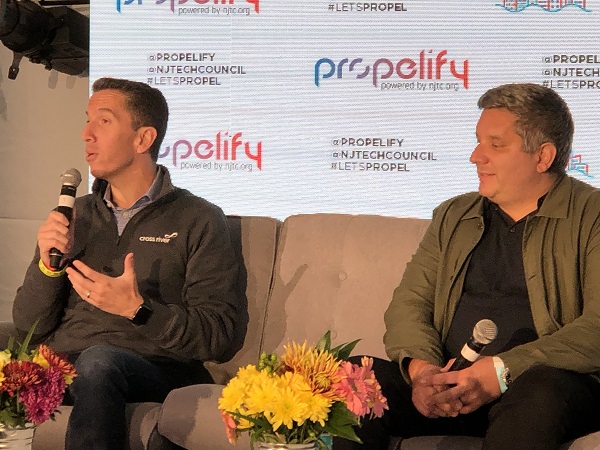Cross River Marries Community Banking with Cutting-Edge Fintech, Exec Says at Propelify
Rain-soaked attendees huddled under a big white tent at the 2019 Propelify Innovation Festival, on October 3, to listen to financial, legal and technology experts explain how they view the future of banking.
One of the talks focused on the emergence of digital banking technology and its impact on the nation’s banking system and consumers.
An executive with Cross River, a Fort Lee-based community bank, told the crowd that the bank has been actively involved in the mercurial growth of fintech and its disruption of traditional banking practices for many years.
In fact, Cross River embraced fintech before most of the big banks took the digital plunge. “We were in fintech before it was sexy,” said Phillip Goldfeder, senior vice president of Cross River’s public affairs department and a former New York politician, of the bank’s decision to partner with fintech firms nearly a decade ago.
“We were in fintech before it was sexy.” Phillip Goldfeder, Cross River
The idea of Cross River joining forces with fintech startups may have seemed like a risky proposition back then, but that didn’t deter Cross River president and CEO Gilles Gade, who started the business during what some would contend was the worst possible time.
In 2008, amid the deepening global financial crisis, Gade opened Cross River’s branch in Teaneck on the assumption that the state-chartered bank could do a better job than the big banks, many of which were in financial distress.
A couple of years later, Gade took notice of startups offering digital banking technology, and thought that partnerships with them would eventually become a competitive advantage for Cross River.
Today, the bank has more than a dozen partnerships with major fintech firms, including payments platform Stripe (San Francisco); online finance firm Rocket Loans (Detroit); and Coinbase (San Francisco), a digital currency exchange.
Cross Bank has also expanded its staff from a handful of employees during its early days to its current workforce of nearly 300.
While larger banks have integrated fintech into their operations in recent years, it’s hardly been a smooth transition for some of them. “A lot of the big banks are struggling to understand it [fintech], and even those that understand it are struggling to change their business model,” Goldfeder said.
A case in point: Some of the world’s largest financial institutions have botched attempts to go digital in consumer banking.
For instance, it was reported last month that Wall Street investment titan Goldman Sachs (New York) lost $1.3 billion on its consumer banking venture, called “Marcus,” since its inception in 2016.
“If you’re a successful fintech company in New Jersey, you can be just as successful anywhere in the world.” Phillip Goldfeder, Cross River
Another example of a big bank’s failure in the fintech space was the recent breakup of a three-year partnership between JPMorgan Chase (New York) and fintech firm OnDeck (New York). The partnership had allowed Chase to offer small business loans online.
Goldfeder said that it didn’t last because these were “two different companies with different philosophies that were trying to squeeze themselves together to offer this service.”
He noted that the fact that Cross River is a small community bank allows it “to be nimble enough to shift on a dime, whereas big banks are struggling to do that.”
Operating within New Jersey’s highly regulated banking system also has contributed to the bank’s competitive edge.
According to Goldfeder, the state’s banking regulations allowed Cross River to demonstrate its ability to be innovative while adhering to some of the strictest banking regulations in the country. “If you’re a successful fintech company in New Jersey, you can be just as successful anywhere in the world,” he said.




